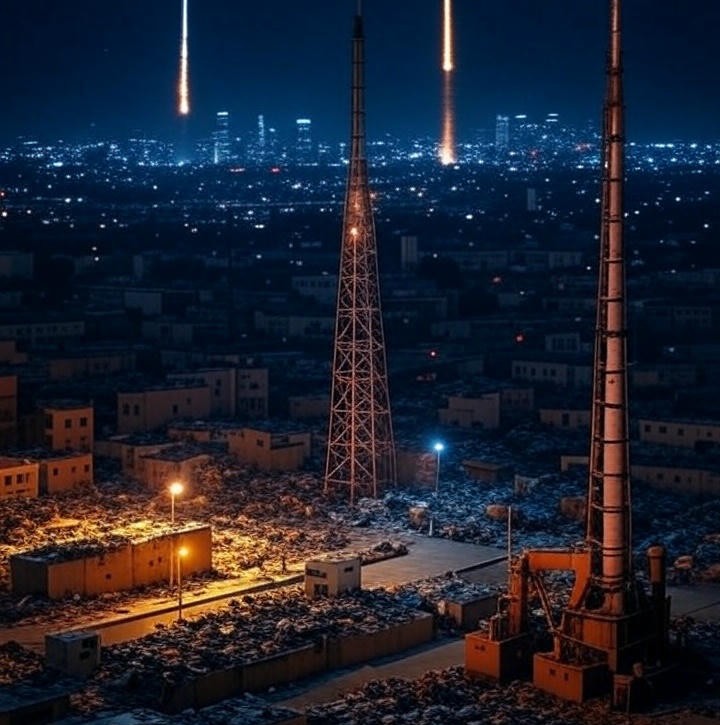Israel‑Iran :The ongoing conflict between Israel and Iran has once again shaken the global financial markets. As tensions between the two countries rise investors around the world are reacting strongly. Oil prices are up stock markets are down and people are looking for safer places to keep their money.
How this conflict is affecting oil, gold, currencies, stock markets and the overall global economy.

The Conflict: What’s Happening?
In recent weeks Israel has launched a series of airstrikes on Iranian targets. These attacks are part of a long-standing conflict between the two nations mostly centered around Iran’s support for militant groups in the region and its nuclear program. Iran has also responded with threats and there is fear that the conflict could escalate into a larger regional war.
This uncertainty has made global investors nervous.
Oil Prices Surge
One of the most immediate effects of the Israel-Iran conflict has been the rise in oil prices. Since the fighting intensified Brent crude oil has jumped by around 7% to 11% reaching a five-month high near $74.60 per barrel.
Why does this happen?
- Middle East Importance: The Middle East is one of the world’s biggest oil-producing regions. Any conflict there could disrupt supply.
- Fear of Escalation: If the conflict spreads to other countries or if shipping routes like the Strait of Hormuz are affected global oil supply could be reduced.
- Investor Panic: Even if the actual oil supply is not yet impacted fear alone can push prices up because traders expect shortages.
This rise in oil prices affects everyday people too. Higher oil prices mean:
- More expensive fuel at petrol pumps
- Higher transportation costs
- Increased prices for goods especially food and manufactured items
Gold and U.S. Dollar Rise
When there is trouble in the world, investors usually run towards “safe haven” assets — things that are expected to hold their value even in times of crisis. Two popular safe havens are gold and the U.S. dollar.
- Gold has seen strong demand in recent days. Investors see it as a safe store of value.
- The U.S. dollar has also strengthened against other currencies. This is because it is considered the most stable currency in the world during uncertain times.
If you are holding gold this is good news. But a stronger dollar can also mean:
- Emerging market currencies weaken
- Global trade becomes more expensive
- Developing countries may struggle with debt repayments
Stock Markets Drop
While oil and gold are rising stock markets are falling. The conflict has made investors worried about the future of the global economy. Stock market futures (which show how markets are expected to open) have declined. Particularly affected are:
- Airline stocks because higher oil prices increase fuel costs
- Travel and tourism companies due to fears of reduced travel
- Global equity markets as investors shift away from risky assets
When stock markets fall:
- Investor confidence drops
- People lose wealth in their portfolios
- Companies may cut spending or hiring
Why the Conflict Matters Globally
Even though the conflict is in the Middle East its effects are felt worldwide. Here’s why:
- Global Oil Dependence: Most countries rely on oil from the Middle East. Any disruption hits the global economy.
- Investor Sentiment: Financial markets are connected. Fear in one region spreads to others through global trading.
- Geopolitical Risks: An extended conflict could pull in other countries like the U.S., Russia or members of NATO making the situation worse.
What Investors Should Watch
As the situation develops investors will be watching several things closely:
- Will the conflict spread to other countries like Lebanon, Syria, or Iraq?
- Will Iran try to block oil exports in the region?
- Will Western nations, especially the U.S., become directly involved?
- How will OPEC react to rising oil prices — will they increase supply?
Each of these factors could change market behavior in a big way.
How Can Individuals Prepare?
If you are someone who invests or manages a household budget here are a few things to consider:
1. Watch Oil Prices
If fuel costs rise try to reduce fuel usage where possible. Consider public transportation or carpooling.
2. Hold Some Safe Assets
Investing in gold or fixed deposits may help protect your savings in times of uncertainty.
3. Avoid Panic Selling
Markets often react sharply in the short term but long term investors should avoid making sudden decisions based on fear.
4. Diversify Your Portfolio
Make sure your investments are spread across sectors and countries to reduce risk.
Final Thoughts
The Israel-Iran conflict is a reminder of how geopolitical tensions can shake the global financial system. Oil prices are rising, gold is gaining and stock markets are falling — all signs of fear in the markets.
While the future is uncertain staying informed and making calm thoughtful decisions is the best way to navigate such turbulent times.
Let’s hope for peace and stability in the region not only for the sake of markets but for the millions of people living in the affected areas.
Stay tuned to TrustWealthHub for more updates on global financial news and how it affects your money.
